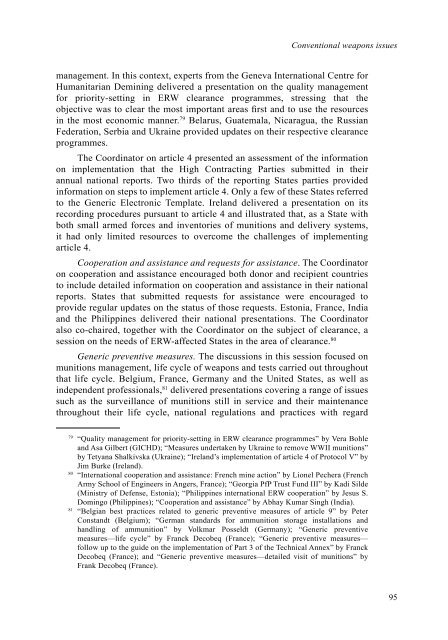DYB2011-Part-II-web
DYB2011-Part-II-web
DYB2011-Part-II-web
You also want an ePaper? Increase the reach of your titles
YUMPU automatically turns print PDFs into web optimized ePapers that Google loves.
Conventional weapons issues<br />
management. In this context, experts from the Geneva International Centre for<br />
Humanitarian Demining delivered a presentation on the quality management<br />
for priority-setting in ERW clearance programmes, stressing that the<br />
objective was to clear the most important areas first and to use the resources<br />
in the most economic manner. 79 Belarus, Guatemala, Nicaragua, the Russian<br />
Federation, Serbia and Ukraine provided updates on their respective clearance<br />
programmes.<br />
The Coordinator on article 4 presented an assessment of the information<br />
on implementation that the High Contracting <strong>Part</strong>ies submitted in their<br />
annual national reports. Two thirds of the reporting States parties provided<br />
information on steps to implement article 4. Only a few of these States referred<br />
to the Generic Electronic Template. Ireland delivered a presentation on its<br />
recording procedures pursuant to article 4 and illustrated that, as a State with<br />
both small armed forces and inventories of munitions and delivery systems,<br />
it had only limited resources to overcome the challenges of implementing<br />
article 4.<br />
Cooperation and assistance and requests for assistance. The Coordinator<br />
on cooperation and assistance encouraged both donor and recipient countries<br />
to include detailed information on cooperation and assistance in their national<br />
reports. States that submitted requests for assistance were encouraged to<br />
provide regular updates on the status of those requests. Estonia, France, India<br />
and the Philippines delivered their national presentations. The Coordinator<br />
also co-chaired, together with the Coordinator on the subject of clearance, a<br />
session on the needs of ERW-affected States in the area of clearance. 80<br />
Generic preventive measures. The discussions in this session focused on<br />
munitions management, life cycle of weapons and tests carried out throughout<br />
that life cycle. Belgium, France, Germany and the United States, as well as<br />
independent professionals, 81 delivered presentations covering a range of issues<br />
such as the surveillance of munitions still in service and their maintenance<br />
throughout their life cycle, national regulations and practices with regard<br />
79 “Quality management for priority-setting in ERW clearance programmes” by Vera Bohle<br />
and Asa Gilbert (GICHD); “Measures undertaken by Ukraine to remove WW<strong>II</strong> munitions”<br />
by Tetyana Shalkivska (Ukraine); “Ireland’s implementation of article 4 of Protocol V” by<br />
Jim Burke (Ireland).<br />
80 “International cooperation and assistance: French mine action” by Lionel Pechera (French<br />
Army School of Engineers in Angers, France); “Georgia PfP Trust Fund <strong>II</strong>I” by Kadi Silde<br />
(Ministry of Defense, Estonia); “Philippines international ERW cooperation” by Jesus S.<br />
Domingo (Philippines); “Cooperation and assistance” by Abhay Kumar Singh (India).<br />
81 “Belgian best practices related to generic preventive measures of article 9” by Peter<br />
Constandt (Belgium); “German standards for ammunition storage installations and<br />
handling of ammunition” by Volkmar Posseldt (Germany); “Generic preventive<br />
measures—life cycle” by Franck Decobeq (France); “Generic preventive measures—<br />
follow up to the guide on the implementation of <strong>Part</strong> 3 of the Technical Annex” by Franck<br />
Decobeq (France); and “Generic preventive measures—detailed visit of munitions” by<br />
Frank Decobeq (France).<br />
95


